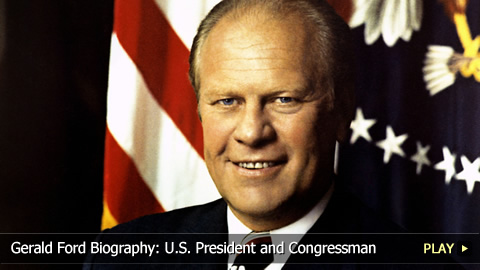Gerald Ford Biography: U.S. President and Congressman

Growing Up
Leslie Lynch King, Jr. was born July 14th, 1913 in Omaha, Nebraska. Shortly after his birth, his parents divorced and eventually he took his stepfather’s name to become Gerald Rudolph Ford, Jr.
Sports
The young Ford excelled in sports and Boy Scouts. His skills allowed him to play varsity football at the University of Michigan, while studying economics and political science. With aspirations to attend Yale Law School, the all-star athlete and undergraduate student paid his college costs by washing dishes and waiting tables. This humble and determined approach to achieving his goals characterized Ford throughout his career.
Law School
After graduating in 1935, Ford entered law school. There, he took interest in politics and signed a petition to prevent U.S. involvement in the Second World War. He was a proud nationalist and supported isolationist policies he felt would ensure the security and safety of Americans.
World War II
Things changed after the Japanese attacked Pearl Harbor in 1941: Ford left his law practice in Grand Rapids to enlist in the Navy, where he participated in air strikes throughout the Asian Pacific. After almost dying in a vicious typhoon in 1944, he resigned with honors two years later. But this involvement in the war later led him to favor internationalist policies.
Marriage
The late ‘40s saw the former pilot enter politics. Right before his successful election to Congress in 1948, he married former dancer and model Elizabeth Bloomer Warren, with whom he eventually had four children.
Congress
As a Republican politician, Ford’s uprightness, hard work, and reputation for dealing well with both parties got him reelected 12 times, and earned him the admiration of his fellow congressmen. While in Congress, he helped secure funds to renovate the White House, in addition to serving on the Warren Commission to explore the circumstances of President John F. Kennedy’s assassination.
Federal Politics
Ford finally had the opportunity to enter federal politics in 1964 when Democrat Lyndon Johnson won the presidency and left the Republicans in need of a House Minority Leader. Ford was the first choice for the job, and once sworn in he limited the reach of Johnson’s Great Society programs and laid out a clear plan for American success in the Vietnam War.
Vice President
Opportunity knocked again in 1973 when Vice President Spiro Agnew stepped down amid the Watergate scandal and Ford became his replacement. One year later, incriminating evidence against President Richard Nixon surfaced, and he too resigned. Without being voted in, Ford became the 38thPresident of the United States on August 9th, 1974.
Presidency
The Nixon administration left him with numerous problems: a depressed economy, the fallout from Watergate, an energy crisis and a war abroad that was spiraling out of control. One of his first moves as President was to issue a controversial pardon to Nixon, despite heavy condemnation from politicians
and the public.
Domestic Policy
With Nelson Rockefeller as his VP, Ford attacked domestic policy: he managed inflation and unemployment by cutting taxes and spending, and by deregulating certain industries. He and his wife Betty were also vocal about subjects like women’s equality, addiction and even cancer, and this also colored his presidency.
Foreign Policy
Abroad, Ford helped end the Vietnam War, though he was criticized for falling short in terms of aid in South Vietnam. He was also condemned for backing the Helsinki Accords between Western Nations and the Communists, and for his policy regarding the Panama Canal and later the Indonesian occupation of East Timor.
Assassination Attempts
This disapproval may have led to two assassination attempts within a three-week period in September 1975. Even with his life threatened, Ford ran for President the next year. Though he was ultimately defeated by Democrat Jimmy Carter, Ford was thanked for restoring honor to the White House.
Post-Presidency
Ford stayed active in business and politics, even expressing support for the equal rights of gays and lesbians in the new millennium. Unfortunately, his health deteriorated and the 93-year-old died on December 26th, 2006.
Right Man at the Right Time
Though many of his decisions were challenged, Gerald Ford proved he was the right man for the job when he took office. Thanks to his personal integrity and honesty, he is ensured a place in history.
